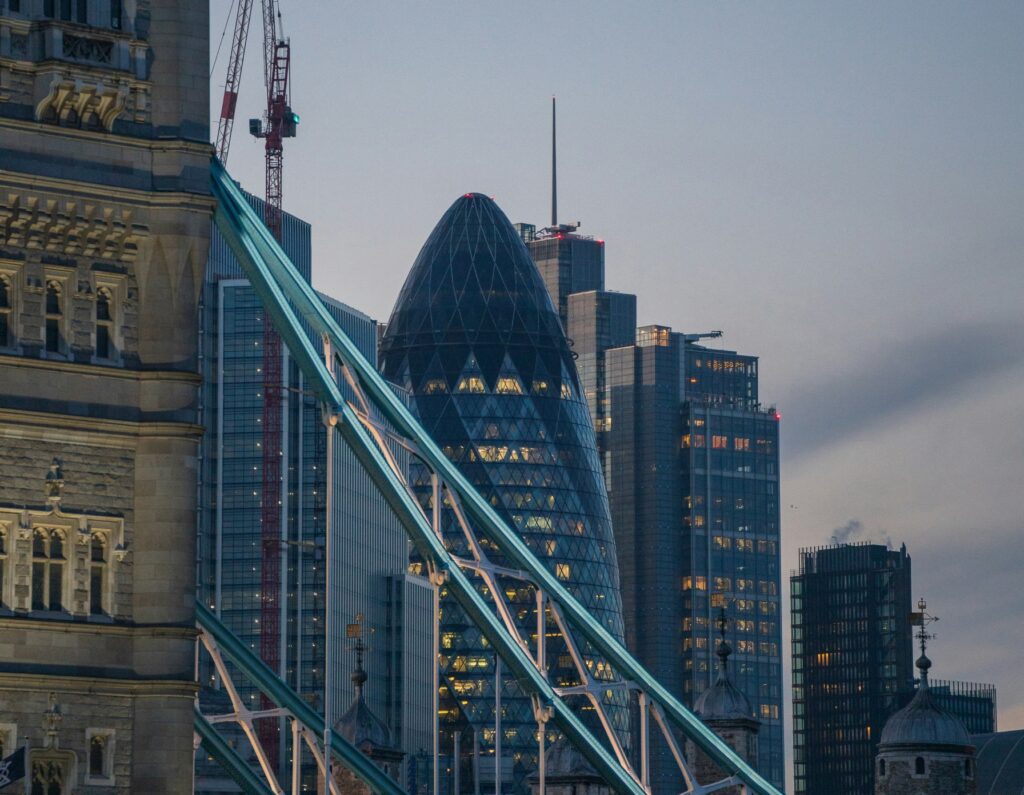
London is one of the world’s busiest cities, with over 14.37 million people in its metro area and a GDP of £562.2 billion (2022). Because of its size, it’s a place where opportunities are always within reach. Its financial and cultural clout only adds to that.
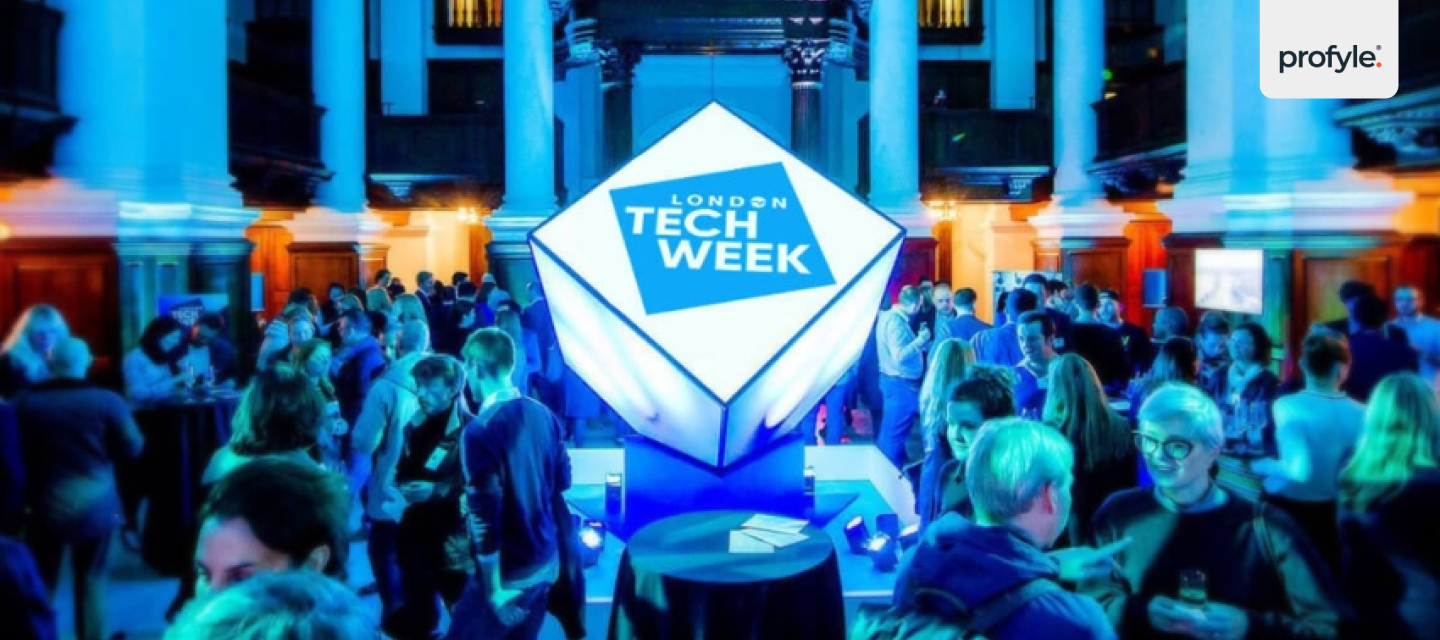
London’s events can open doors like nowhere else. Based on numbers alone, it hosts a significant part of the UK’s 450,000 annual business events. Major events like London Tech Week and the London Business Show take place here. As well as industry-specific meetups in sectors such as finance, tech, media, and property.
But it is not only the sheer number of events. It is the financial and cultural context that makes all the difference. The quality of the network and the opportunities you gain are hard to match. So, if you are a bit on the fence whether to network in London or not – just do it.

You may find it surprising that London is still the global financial capital. It has made up for a fall in deal volume by focusing on sustainability and an open business environment. Here’s what a recent study states:
“Although London saw a decrease in capital markets activity and assets under management, it ranked top in both sustainable finance and talent and skills,” the City of London said in a statement.
And
London’s regulatory quality and openness to businesses through the newly introduced Financial Services and Markets Act and the Edinburgh Reforms landed it in the top position with an overall competitiveness score of 59, down from 60 in 2023, while New York decreased its score by 3 points to 57. Singapore placed third again dropping three points to 48 and Frankfurt sits fourth with 44 and Paris fifth with 40.
Keep in mind the concepts of sustainability and openness, as they are key to networking.

Audley Travel recently ranked London as the best city in the world for culture. The reasoning is simple: nowhere else in the world do you get this combination of…
Hundreds of museums and galleries that offer variety and can serve as event backdrops.
A well-educated populace and workforce. Even a casual chat can be enlightening and helpful.
Dozens of highly-regarded universities and research institutions.
A vibrant nightlife for after-event parties and meetups.
Beautiful architecture and historical neighbourhoods and boroughs that fit the palette for every event.
It is helpful to picture London as a vast invisible network. A network that spans tech, finance, media, property, and the arts. With hundreds of thousands of individual events as hubs connected to each other. It connects people seeking to build careers, to learn, and to find customers and partners.
The unique cultural and financial forces of London helps everything flow faster and more smoothly. As a result, all of these general benefits of networking are magnified:
You Meet People in Person: Face-to-face interactions are powerful. A Harvard Business Review study found that face-to-face requests are 34 times more successful than email. When you meet someone at an event, it’s much easier to create a real connection, something that’s hard to do over LinkedIn or email alone. Mix up the digital with the real-world.
You Build Trust: In-person interactions help build trust faster. PwC research shows that there is a significant trust gap of at least 15% between how businesses feel they are trusted and how customers and employees actually trust the business. That’s true for a freelancer as it is for a large business. It’s easier to establish that trust after meeting someone in person.
You Learn New Skills: Many networking events include workshops, panels, or talks by industry experts. These sessions allow you to learn about the latest trends and get advice from leaders in your field. Tech networking events often feature speakers from top companies like Google and Microsoft. You get access to experts you can’t find elsewhere.
You Advance Your Career. Being proactive not only benefits your current business but also your career as an individual. A study by the Oxford Economics Group found that networking can boost career advancement by up to 20%. Why? Because these events allow you to meet people who can open doors, offer insights, and help you grow in your field.
Combine the Digital and the Physical. With 65% of UK”s professionals using digital networking channels and 32+ million people from the UK on LinkedIn a smart play is to combine your outreach via LinkedIn and email with events.
The caveat is that only those that prepare and do their homework get to reap these benefits.
So the real question is: how can you make the most of that network in London? Well, first you have to map out what types of events are out there.
There is no one-size-fits-all for networking events, especially in a city like London. Here are some common types of networking events. Each offers unique opportunities.
These events focus on connecting professionals across various industries. They are usually held at business venues. The goal is to foster partnerships and opportunities. Large organisations such as the London Chamber of Commerce often host these events.
A prominent example is the Business Owners Club Autumn Networking Reception. This event lets business owners connect, share ideas, and build relationships. It’s in a relaxed setting. It is for business leaders who want to meet new people and discuss growth strategies.
Another example is The Business Show, held annually at the ExCeL Centre. It attracts over 25,000 attendees. It has workshops, keynote speakers, and networking zones. These allow entrepreneurs, business leaders, and investors to meet and collaborate.
London is one of the world’s leading tech hubs. Tech events often focus on start-ups, innovation, and investment. Events and groups like Tech Nation or London Tech Week attract thousands from around the world.
London is a global leader in tech. London Tech Week is a major tech event in the city. It unites thousands of tech innovators, entrepreneurs, and investors worldwide. The week-long event offers workshops, panels, and networking sessions. These events inside events focus on specific emerging technologies, giving unrivaled opportunities.
Tech London Advocates is a prominent networking group in the city’s tech scene. They host regular networking events that bring together entrepreneurs, investors, and tech professionals. Participants have funded start-ups, found co-founders, and shared tech ideas. This is one example of the tangible benefits that you can get as tech entrepreneur or leader from networking in London.
Some networking events are for specific industries. These include finance, healthcare, or even the creative fields of music and film. These types of events create a focused space. They bring together those with a shared interest or goal.
Are you a professional in the property or construction sector? The London Built Environment’s Property Sector Networking event is perfect for you. This casual networking reception gathers property developers, architects, and real estate professionals. Held each year at The Gherkin, which offers stunning views of London’s iconic skyline. While participants enjoy a relaxed setting for industry-specific discussions.
For those in the creative industries, Raindance Film Festival is a key event. The festival attracts filmmakers, producers, and industry pros. It offers workshops, screenings, and social events to connect. There are also opportunities for more casual networking opportunities for individuals. One example is the The Connecting Film, TV, Music & Media Professionals event at Sanctum Soho Hotel.
Not all networking needs to happen in formal settings. Many Londoners attend casual meetups over coffee or drinks. These low-pressure environments are great for building connections. They allow for a more relaxed atmosphere.
Entrepreneurs in London is Europe’s largest business meet-up group (28,000+ members). It connects entrepreneurs in a casual, supportive setting. They host regular meetups for entrepreneurs to share and pitch ideas. Entrepreneurs can also get feedback. This group is famous for its welcoming vibe. It’s perfect for casual networking over coffee, unlike formal business events.
Another example is the Socialite Connections’ Business Breakfast Club. Venues like Drake & Morgan at King’s Cross host it. This breakfast networking event lets business professionals meet before work. They can exchange ideas over coffee and breakfast in a relaxed setting.

Want to hear about other great events? Subscribe now to stay up-to-date with all the best events happening in London every week.
Click here to find out more
Practical Tips for Networking
To appreciate how to network in London, you must know that it is a city of fierce competition. It is hard to stand out.
Your goal is to make the best of every opportunity, leading to meaningful connections and career growth. Your prepartion can help meet potential clients, secure job leads, or learn from industry experts. Also, make your networking experience smoother and more productive.
Here’s a step-by-step guide to preparing for a networking event, complete with practical tips and real-life examples of why every step matters.

Before going to any networking event, it’s important to know what you’re walking into. You should research the type of event, the industry focus, and, most importantly, who might be attending. This step helps you target your conversations and approach people with shared interests or potential business prospects.
When preparing for a networking event, you should always define your goals in advance. This will help you stay focused during the event and keep you from feeling overwhelmed by the number of people or opportunities around you.
To build relationships.
To follow up.
For building relationships: “I have created 100 new contacts this month.”
For being memorable: “I succeeded in having 35 meaningful discussions.”
For follow up: “I had 15 promising follow-ups leading to potential business.”
An elevator pitch is a brief introduction that summarises who you are, what you do, and why you’re attending the event. It’s named after the concept of being able to explain yourself effectively during a short elevator ride, typically 30 to 60 seconds.
Having a way to quickly share your contact details is vital at any networking event. Traditionally, people used paper business cards, but these can get lost or forgotten. Now, more professionals are turning to NFC digital business cards like those offered by Profyle.
These cards use Near Field Communication (NFC) technology, which allows you to share your contact information with just a tap on someone’s phone.
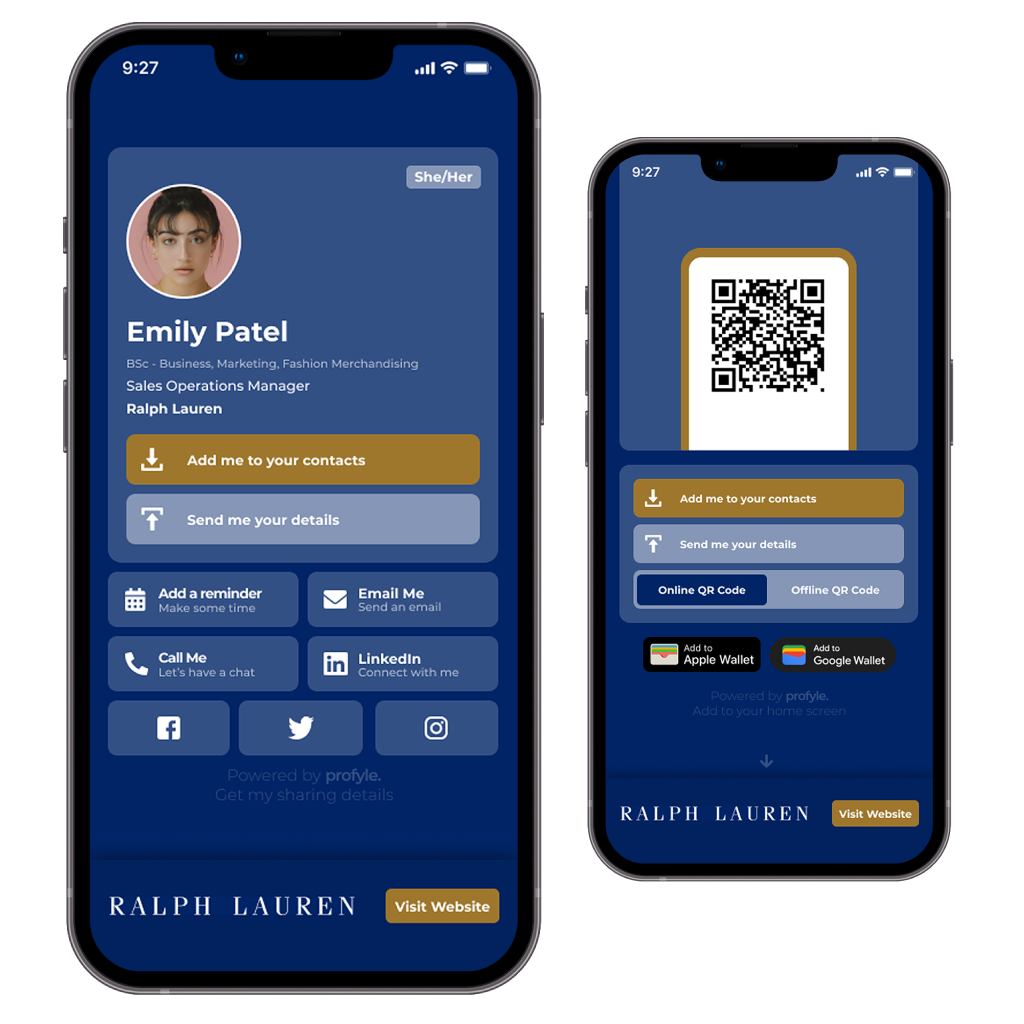
Many people find the hardest part of networking to be starting conversations. To avoid awkward silences, prepare some general questions or topics you can use to initiate or continue discussions. Good networking isn’t just about talking; it’s about listening and asking thoughtful questions.
These types of questions work well because they invite the other person to share their story, which can lead to a more meaningful connection.

The way you present yourself at a networking event can affect how others perceive you. While the dress code varies depending on the event, it’s always a good idea to look professional yet approachable. Keep in mind the nature of the event and dress accordingly.
In the digital age, staying organised at a networking event goes beyond having a notebook and pen. There are many tools and apps that can help you manage your time, track your contacts, and follow up after the event.
Networking doesn’t end when the event finishes. The real value of attending comes from the relationships you continue to build afterward. Preparing for follow-ups is essential to making sure your connections turn into opportunities.
There are a few more unconventional tips to help you get going or get unstuck when preparing for an event. One of my favorites when networking in an competitive environment like London has to do with context.
You will see what I mean in a second. Because London is hyper-competitive, you have to prepare for each event. However, that is where our natural tendency to procastrinate kicks in.
The more we feel like prep work is necessary – the less we do it. That’s where one tip from Atomic Habits can help.
Whenever you feel like procrastinating or feel afraid of taking the next step – try adding specific location and context details to your tasks. Write those additional points of context down alongside your task – and the task suddenly seems more manageable.
Writing down time, location, or context-driven cues to your networking tasks before an event is a very quick and simple way to seem more prepared than others at an event. You will have a sense of focus that will attract people. Even if you do nothing else.
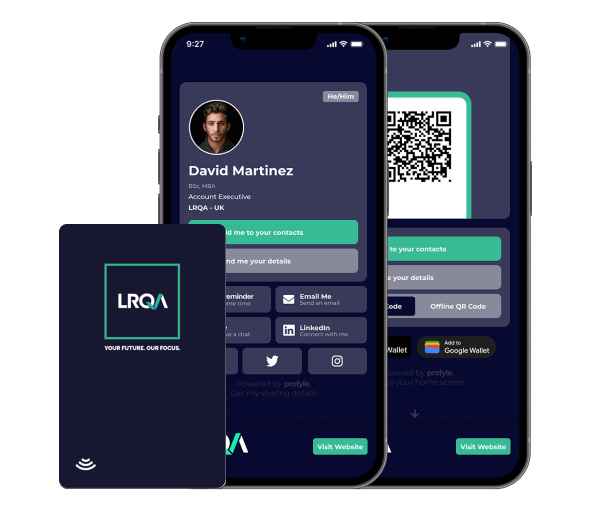
There’s one thing that you need to take along with you to every event in London: a way to share your contact details in a fast, eco-friendly manner. Remember when we mentioned sustainability and openness as important keywords for networking? London is working towards being a zero-carbon city by 2050. People here care more about eco-friendly choices.
Traditional paper business cards often end up in the bin, with studies showing 88% get thrown away within a week. So, using Profyle’s digital business cards is a smarter, greener way to connect.

London’s plan to be a zero-carbon city is serious, and businesses are starting to follow that direction. By using Profyle’s digital business cards, you cut down on paper waste and reduce your environmental impact. You also keep up with a city that’s putting more value on green solutions.
Fantastic service, and a great product. As part of our ESG Policies we’ve been looking at an alternative to traditional Business Cards.
The quality of the product, service, and dashboard made Profyle Card an absolute must. It gives flexibility on the information accessed on a tap of a card, and looks great when we deal with customers.
Digital business cards are a simple yet effective way to avoid contributing to the waste caused by millions of discarded paper business cards. The cards are reusable and updatable, so you never have to print new ones.
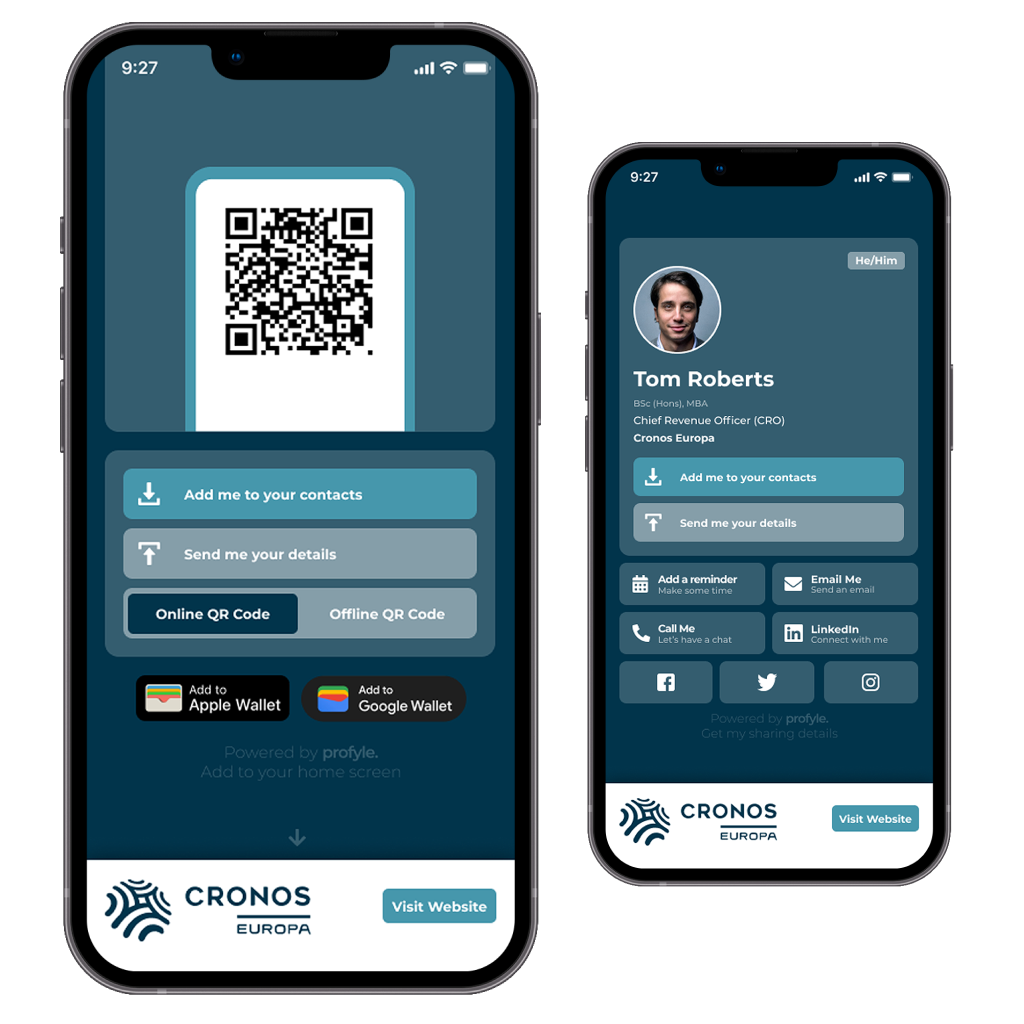
Networking in London can be fast-paced. At major events like London Tech Week or the Business Show, you might meet dozens of people in a single afternoon. Sharing details quickly is important. Profyle’s NFC technology makes this easy. All you need to do is tap your card to someone’s phone, and your information is instantly transferred. No more rummaging through your bag for paper cards.
One happy customer wrote:
“Very good responsiveness in terms of support and customer service. The cards are beautiful, professional and of high quality!”
– Walériane Dubois, Cronos Europa
Profyle’s cards are designed to fit the needs of different industries, whether it’s finance, media, tech, or property. You can add links to your portfolio, social media profiles, or even specific products. This is especially helpful at creative events like the Raindance Film Festival, where professionals often need to show their work on the spot.
A user from the creative industry mentioned:
“A great future facing tech product with one of the most helpful customer service teams I have dealt with. Will continue to recommend as my first choice to customers and clients.”
London is a global city, with professionals from all over the world. Profyle’s digital cards work with both NFC-enabled devices and QR codes, so it doesn’t matter what type of phone someone has. Plus, Profyle cards support multiple languages, making them accessible to professionals from different countries.
Whether you’re a freelancer or part of a large company, Profyle digital business cards are affordable, with prices starting at £7.95 per year. This makes them a great option for professionals at all levels, from those just starting out to those managing large teams.
Profyle’s digital business cards are the perfect fit for London’s fast-moving, eco-conscious, and diverse professional environment. They help you connect faster, reduce waste, and make it easier to share your details, no matter where you are or who you meet.
London is a city full of endless possibilities, but fortunately there are many tools and platforms available to help you narrow down your options. Whether you’re interested in tech, finance, creative industries, or small businesses, these resources can guide you to the perfect events based on your goals and interests.
The simplest way to discover networking events in London is by using online platforms dedicated to hosting professional events. These websites and apps let you search by industry, location, and type of networking you’re seeking.

Some industries host events tailored specifically for their sectors. If you’re looking for events in a specific field, it helps to follow relevant organisations that offer workshops, conferences, and networking sessions.
You don’t always need to rely on official websites to find networking events. Social media is full of opportunities, and many organisers use these platforms to promote their events.

Coworking spaces often host regular events that bring together freelancers, entrepreneurs, and small businesses.
If you’re looking for a more tailored experience, joining a specialised networking group might be the right option. These groups are often designed around specific sectors, such as women in business, start-ups, or industry-specific fields.
Many organisations send out email newsletters that highlight upcoming events in London. Subscribing to these newsletters can save you time and make it easier to stay updated on the latest networking opportunities.
Sign up for our free 45-day trial and experience the future of networking today. Embrace efficiency, embrace sustainability, embrace the future with Profyle Card.
Don’t forget to follow us on LinkedIn, Instagram and Twitter
Copyright © 2025 Profyle Card Ltd. – Registered in England and Wales with company number 12973729.
Business address: 16 Cole Street, London, SE1 4YH, United Kingdom. VAT registration number: GB424998061